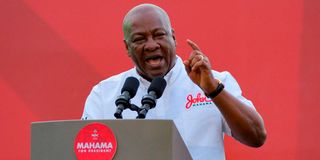Premium
How new Ghana regime plans to fulfil promises

Ghana's President John Dramani Mahama.
Budgets reflect government priorities and are the true test of commitments made during electoral campaigns.
As Kenyans enter another budget season following the debacle of Finance Bill 2024, several parallels will be drawn with Ghana, where a regime that came to power on the wings of a popular wave for change is just settling into office.
The new government in Accra released the first budget of its four-year term this past week.
Per its campaign pledge, a national economic dialogue themed “Resetting Ghana – Building the Economy We Want Together”, preceded the release of the 2025 budget policy. The sobering context for this budget policy is of course the dire straits presently facing the Ghanaian economy.
Still enjoying the goodwill that naturally follows a resolute election victory that has swept away an unpopular incumbent, the question is how long this feel-good effect will last.
A well-articulated campaign pledge that received great public support was the promise to do away with an array of so-called “nuisance taxes”.
Covid levy
First is the Covid-19 Health Recovery Levy. Commonly known as Covid levy, it is a 1 per cent charge that was instituted in 2021 as part of measures to cover pandemic-related expenditure. Second is the 1 per cent levy on electronic funds transfers (e-levy) that was instituted in 2022. The other is the 10 per cent withholding tax on lottery winnings enacted in 2023.
True to their campaign promise, the budget statement confirmed the abolishment of the E-levy and the tax on betting proceeds. Interestingly, abolishment of the Covid levy is to be considered as part of a planned comprehensive Value Added Tax (VAT) reform for which there is a request for technical assistance from the IMF.
And in this quest to ‘show new taxes’, payroll and indirect levies, mainly service taxes like VAT and other sales levies are the choice form of taxation by governments finding themselves in an unsustainable external and domestic debt repayments trap. These are essentially regressive taxes whose burden disproportionately fall on the lower income and poor categories of the population.
Debt restructuring
Ghana is under an IMF support programme on debt restructuring since 2023. This programme has come at great cost to citizens generally. In fact, the initial domestic debt restructuring plan targeted banks and pensioners holding government bonds. But thanks to their fierce fightback, pensioners were eventually exempted from the plan. Tellingly, governments dealing with indebtedness seldom pursue the path of progressive taxation – like corporation profit or asset taxes that would affect those at the top of the pyramid. Moreover, rather than deal with lavish and wasteful government expenditure, austerity is directed at captive target groups.
Incredibly, one of the budget statement’s articulated approaches is to “deliver a shock therapy to the economy”.
There is also the “broadening of the tax base” lingo that is synonymous with expanding income and other indirect taxes, imposing a direct burden on the majority poor and low incomes groups. These enhanced tax administration and compliance measures rarely target the noncompliant wealthy corporate entities and high net worth individuals or natural resource rents.
Kenyans know this dynamic only too well. The bitter irony of a government that rides to power pledging to champion the poor and working-class people, only to resort to regressive tax measures. Designed to avoid debt default at all costs (by pandering to IMF dictates on austerity), a crippling tax burden is falling on the very people it undertook to elevate.
Atieno Ndomo is a Social Policy Analyst with a keen interest in political economy


